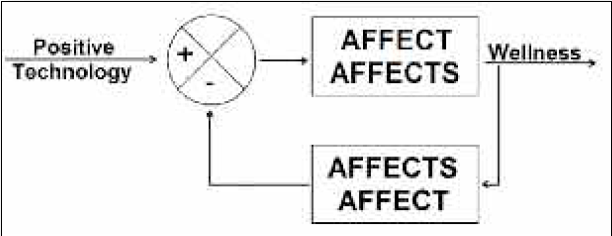Positive psychology arises from Seligman, who coined the phrase “learned helplessness” to describe how negative thoughts can lead to clinical depression. A better explanation, however, derives from the “chain reaction” concept in the physics of complex systems, often defined as positive feedback that leads to self-amplifying effects. The same concept may justify helping technology to instill positive chains of behavior that then lead to well-being.
In this view, a first factor that can increase positive emotions is the explanatory style: the manner in which we routinely explain events in our lives. An optimistic style leads subjects to positively affect affects. But do consequently these affects affect back? This question is at the heart of the “positive technology” approach: the scientific and applied approach to the use of technology for uncovering and understanding people’s strengths and promoting their positive functioning. In fact, many different studies are providing convincing evidences that technology may be used to improve our well-being.
Following positive psychology we can distinguish between: a) hedonic technologies: mood-altering devices, used to induce positive and pleasant experiences; b) eudaimonic technologies: devices designed to develop positive human functioning, strengths and personal empowerment; and c) social/interpersonal technologies: devices that seek to collaboratively thrive and build the best in life for individuals, groups, organizations and society.
A closed-loop need to be considered as a consequence of two main questions arising: 1) how positive emotions can change our life and the way to perceive the world and its interactions? and 2) how is it possible to change one’s own emotions improving the life quality? Positive technology can foster a positive loop, beyond the theory, towards the practice. To make this possible technology needs to be part of the one’s own sphere, needs to be perceived as intimate. For example, mobile phone often satisfy this requirement.
But, as recently highlighted by Cipresso et al in a recent article published by Neurocomputing: is your phone so smart to affect your states? If it is the case, then technology can really foster positive emotions and we can start to think to a future for a positive technology, where a closed-loop of affection can become a sort of “positive addiction” that we could call “affiction” to indicate a positive experience of a subject addicted to affects in a continuous closed-loop devoted to wellness.
An increasing number of research fields is, directly or indirectly, connected to positive technology paradigm, in a way unimaginable few years ago. For example, sophisticated technologies, such as the mobile biofeedback, can further amplify the quality and quantity of the beneficial outcomes. Also, affecting computing field is exploring new opportunities to make use of human affects in a way that can affect humans affects back. And more recently, social network sites, such as Facebook, are becoming more and more a tool to engage and increase positive emotions. “Facebook Use Elevates Mood” as showed in recent researches.
Future research needs to focus in more depth on the processes that makes technology a powerful tool for affecting affects.
Pietro Cipresso, Ph.D., et al. Applied Technology for Neuro-Psychology Lab IRCCS Istituto Auxologico Italiano Italy p.cipresso@auxologico.it www.pietrocipresso.eu
About Brenda Wiederhold
President of Virtual Reality Medical Institute (VRMI) in Brussels, Belgium.
Executive VP Virtual Reality Medical Center (VRMC), based in San Diego and Los Angeles, California.
CEO of Interactive Media Institute a 501c3 non-profit
Clinical Instructor in Department of Psychiatry at UCSD
Founder of CyberPsychology, CyberTherapy, & Social Networking Conference
Visiting Professor at Catholic University Milan.








